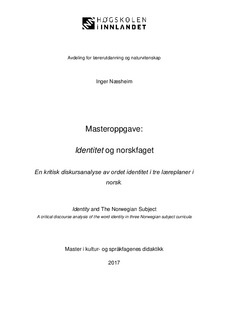| dc.contributor.author | Næsheim, Inger | |
| dc.date.accessioned | 2018-05-23T09:10:39Z | |
| dc.date.available | 2018-05-23T09:10:39Z | |
| dc.date.issued | 2017 | |
| dc.identifier.uri | http://hdl.handle.net/11250/2498831 | |
| dc.description | Mastergradsoppgave i kultur- og språkfagenes didaktikk, Avdeling for lærerutdanning og naturvitenskap, Høgskolen i Innlandet, 2017. | nb_NO |
| dc.description.abstract | Norsk:
Formålet med denne masteroppgaven er å framstille noe av historisiteten til ordet identitet i sammenheng med norskfaget. Med utgangspunkt i Norman Fairclough (2003) sin tilnærming til kritisk diskursanalyse, utfører jeg en analyse av hvordan ordet identitet fremstår i tre læreplaner i norsk. Her er denne undersøkelsen konkretisert i to følgende forskningsspørsmål; hvilke mulige konseptualiseringer av identitet fremstår ordet for å referere til i sammenheng med norskfaget? hvilke potensielle funksjoner fremstår ordet for å ha i sammenheng med norskfaget? Som en kortfattet besvarelse på problemstillingen er en oppsummerende konklusjon at ordet identitet fremstår for å referere til flere mulige konseptualiseringer av identitet i forbindelse med norskfaget - i de tre læreplanene i norsk. I K06 skjer det et skifte i hvilke konseptualiseringer ordet fremstår for å referere til i sammenheng med faget. Der hvor ordet i mer eller mindre grad fremstår for å referer til to overnevnte konseptualiseringer både i M87 og i L97, er ikke disse aspektene fremtredende i K06. Et annet skifte er også at identitet ikke lenger er representert i tekstpartier som omhandler behandling av skjønnlitterære sjangere i norskfaget. Ordet fremstår også for å fylle flere sentrale funksjoner i forbindelse med norskfaget. Identitet fremstår med en legitimerende kraft i de tre læreplanene og fungerer potensielt som en markør for beskrivelser av sentrale fokus i norskfaget i tiden læreplanene er utformet. Identitet fremstår også konstituerende for norskfagets identitet og demarkasjon. | nb_NO |
| dc.description.abstract | English:
The aim of this thesis is to present a piece of the historicity of the word identity in conjunction with the Norwegian subject. Based in Norman Fairclough's (2003) approach to critical discourse analysis, I conduct an analysis of how the word identity appears in three Norwegian subject curricula. The analysis is guided by the following questions; what possible conceptualizations presents the word to refer to in conjunction with the Norwegian subject? What potential functions does the word identity appear to have in associated with the Norwegian subject? A summarizing conclusion is that the word identity appears to refer to several possible conceptualizations of identity in conjunction with the Norwegian subject - in the three Norwegian subject curricula. In K06 there is a shift in what conceptualization the word appears to represent in conjunction with the subject. Situations in which the word appears to represent both the above-mentioned conceptualizations in M87 and in L97, are not similarly prominent in K06. Another shift is that identity is no longer represented in text sections that deal with the treatment of fictional genres in the Norwegian subject. The word also appears to fill several key functions in conjunction with the Norwegian subject. Identity appears with a legitimizing force in the three curricula studied and functions as a potential marker for describing central focuses in the Norwegian subject at the specific time in which each curriculum was designed. Finally, identity appears to act as constituent for the Norwegian subject identity and demarcation. | nb_NO |
| dc.language.iso | nob | nb_NO |
| dc.subject | MIKS | nb_NO |
| dc.title | Identitet og norskfaget. En kritisk diskursanalyse av ordet identitet i tre læreplaner i norsk. | nb_NO |
| dc.title.alternative | Identity and The Norwegian Subject. A critical discourse analysis of the word identity in three Norwegian subject curricula. | nb_NO |
| dc.type | Master thesis | nb_NO |
| dc.subject.nsi | VDP::Humaniora: 000::Språkvitenskapelige fag: 010 | nb_NO |
| dc.source.pagenumber | 94 | nb_NO |
